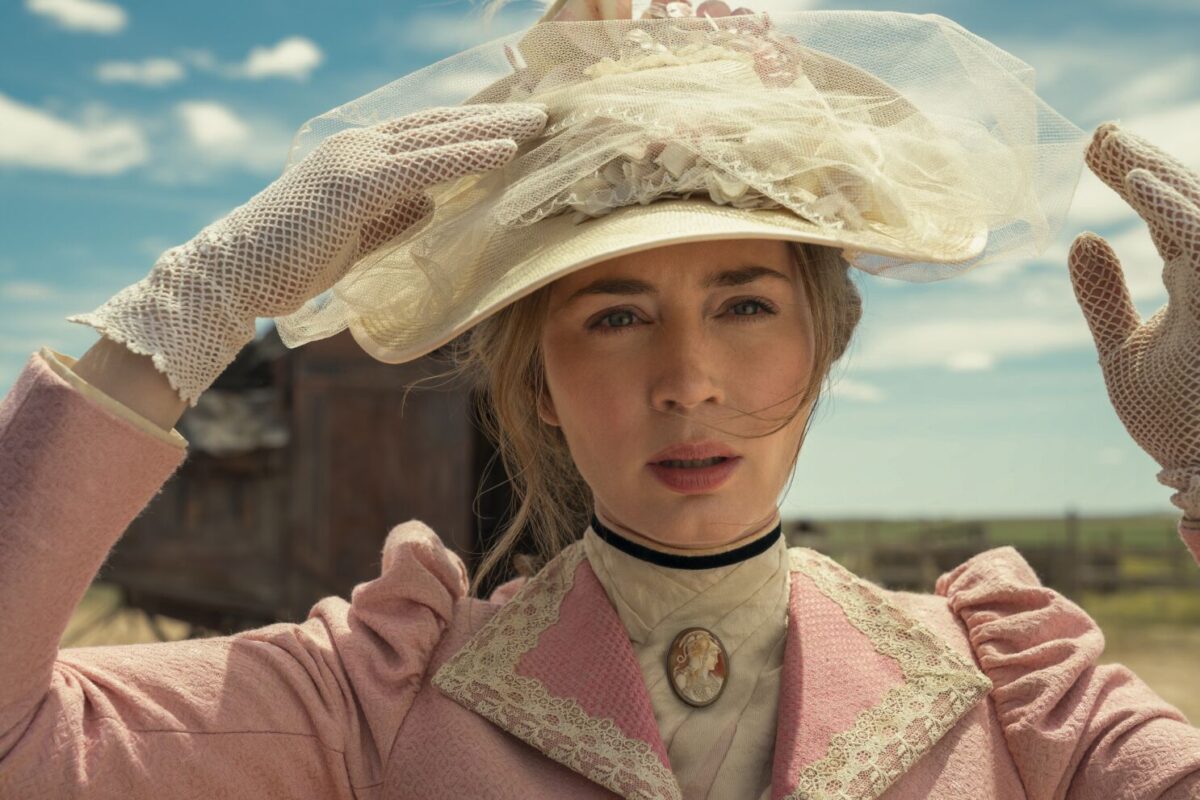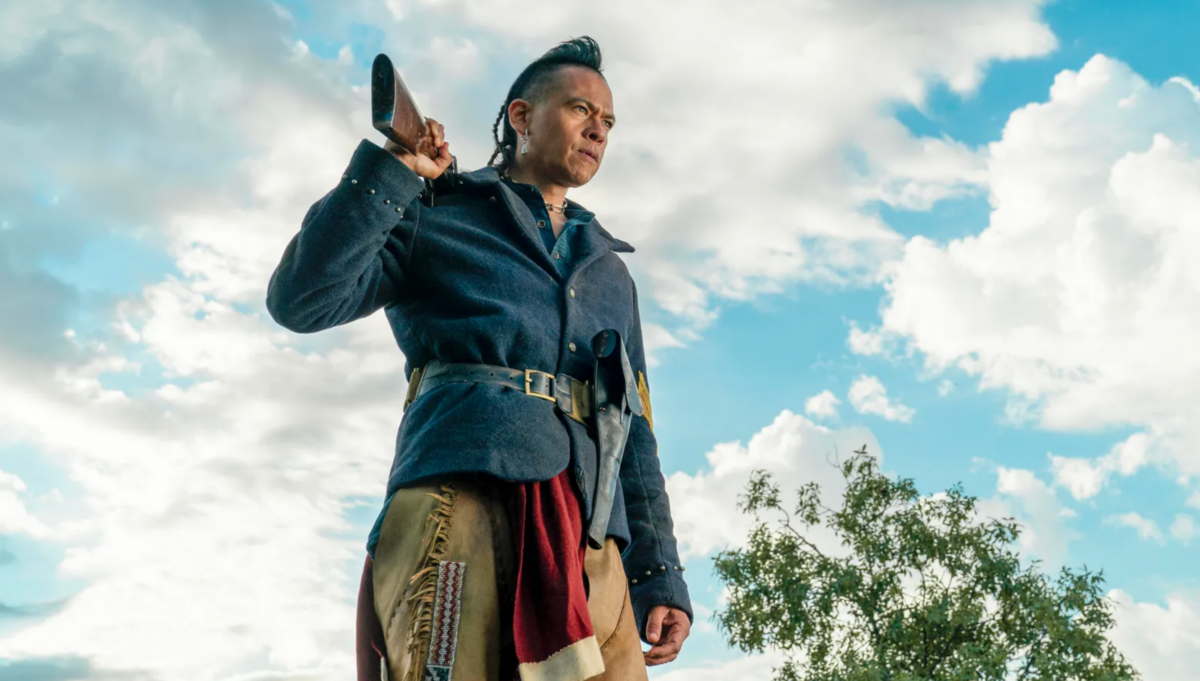Spoiler Alert
If you want a TV series that, to a large extent, accurately re-enacts the genocide of the native Americans during the late 19th century, then this one makes a good fist of it. The series has a strong feminist thread running through it too.
It has a classic Western journey/revenge plot as Cornelia, an English lady played by Emily Blunt, travels to America to find and try to kill the man who has abused her and ruined her life. She joins forces with a Pawnee who previously worked as a scout for the US Cavalry. Her quest for revenge gets mixed up with another one when a Cheyenne chief tries to kill the four soldiers and Emily’s target, who killed his family and other membersof the tribe. Along the way we learn about the conflicts between ranchers and farmer settlers, the place of religious groups like the Mennonites in the forced removal of indigenous peoples, how bushwhacker criminals preyed on the westward advancing settlers and the difficult choices facing the defeated tribal peoples.

Each episode contains some viscerally violent scenes. There are no mythical face-to-face gunfights in the sun. People are shot in the back by rifles, both natives and settlers practice scalping, and the technological superiority of weapons is much more important than any notions of bravery or fighting ability. You are shown a sort of crude Gatling machine gun, and then the director does not use any close-ups of the Cheyenne massacre; you just hear the thumping of this heavy weapon.

One successful entrepreneur showcases his buffalo gun that can kill sitting beasts at 700 yards. Later, he uses the same gun to try and kill the leading couple. He also recounts the story of killing hundreds and thousands of buffalo with such weapons. He says that when the buffalo were taken away from the Great Plains, the Native Americans lost their main source of food and were almost wiped out.
The English demonstrates the distinct nature of settler expansion in the west. This was not the same as the English colonial settler expansion in Africa, which led to direct colonial rule, even if the violence was similar. The settler conquest was carried out by a US state that was already independent and where the bourgeoisie had already consolidated its rule after a bloody civil war against the South. The US state encouraged migrants from the Old World to carry out this conquest. The conquest was accomplished through capitalist entrepreneurship, with ranchers, large farms, gold mines, and companies in charge of infrastructure such as telegraphs and railways. Unscrupulous entrepreneurs would fund individuals to claim land allocated by the government and then take it over later; there was already a strong impetus toward capitalist accumulation and centralisation.
Once the Native Americans were defeated, the US state organised schools and other institutions to forcibly assimilate them and destroy their identity and culture. These aspects of a terrible history are woven into the narrative in a seamless way.
What a story it is, too! Cordelia’s back story and the details of the Cheyenne massacre are gradually revealed. In nearly every episode, we see Cordelia escape death, and she becomes more and more fearless in her ability to respond to violence with violence. It helps, of course, that she was already an accomplished archer back in the old country.
From Watts, who tries to kill Cornelia in the first episode, to Black Eyed Mog and, worst of all, Melmont, the villains are truly grotesquely evil. You want to turn away from the screen at times because of their heinous actions.
The relationship between Cordelia and Eli, the Pawnee scout, drives the plot forward, and they become closer. There is a wonderful cultural interaction between the Native American and the English gentlewoman as they look at the stars at night. The script is profound and lyrical at times, which is also reflected in the way the Great Plains’ natural beauty is filmed. Her abuse at the hands of men perhaps allowed her to empathise with the terrible repression of the native tribes.
The script is profound and lyrical at times, which is also reflected in the way the Great Plains’ natural beauty is filmed.
Eli’s character is interesting. It is contradictory because his family was killed by the settlers or cavalry, but he ended up working for the cavalry as a scout. His dream is to get 60 acres of land that retired soldiers were allocated, but as another character says, there is no guarantee that he will be able to get the claim since he is “an Indian.”
We could quibble a bit at the jumping about in time and location in certain episodes. You almost feel like you need some sort of map to keep track of the story. The time jumps get easier as all the threads come together.
The showdown at the end mirrors some of the classic westerns made by John Ford and others. A final comment on the fate of the native peoples is expressed in the scene showing a “Buffalo Bill” fairground show. These had become popular in Britain at the turn of the century, where “battles” between native Americans and the US army were recreated. A short clip of one of the first westerns ever made – in Blackburn! – is shown in the final credits. The series correctly wishes to emphasise how the actual history of the settler war against Native Americans has been completely distorted and recuperated in the majority of Western films.
Emily Blunt was the producer of this film, and the role of women in creating these new, positive developments in the Western genre is significant. The 2021 film, “Power of the Dog,” by the New Zealand filmmaker Jane Campion, does a similar job of changing our expectations and understandings of the history of the West. “Meeks Cutoff” and “First Cow“ by Kelly Reichardt are other examples of a different approach to the Western.
The show has received rave reviews, – that are fully justified.
Art Book Review Books Campism Capitalism China Climate Emergency Conservative Government Conservative Party COVID-19 Creeping Fascism Economics EcoSocialism Elections Europe Far-Right Fascism Film Film Review Fourth International France Gaza History Imperialism Iran Israel Italy Keir Starmer Labour Party Long Read Marxism Marxist Theory Migrants Palestine pandemic Protest Review Russia Solidarity Statement Trade Unionism Ukraine United States of America War Women

